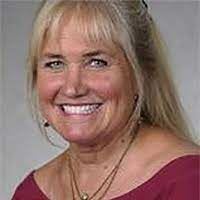A Celebration of Excellence in Public Participation:
The IAP2 USA Core Values Awards
What are the IAP2 Core Values Awards?Each year, IAP2 affiliates around the world recognize leaders in the profession through the IAP2 Core Values Awards. The awards go to projects which best demonstrate IAP2's Core Values and help to raise the bar in the field of public engagement by sharing best practices and inspiring the P2 community to learn from one another.
Competition for the 2024 AP2 USA Core Values Awards offered some outstanding projects. Our appreciation goes to our judges for their challenging work. | Public participation is based on the belief that those who are affected by a decision have a right to be involved in the decision making process. Congratulations 2024 Core Values Award Winners!The 202 IAP2 USA Core Values Awards - presented October 24, 2024 at the North American Conference in Ottawa, Ontario. |
Core Values Award: General Project and Project of the Year"Better Bus Network Redesign Public Engagement"
|
Metro launched the agency’s largest comprehensive public engagement initiative called Better Bus Experience LIVE! in spring 2023 as part of Metro’s “Better Bus” initiative which includes a bus network redesign, transition to zero emission buses, new modern bus facilities, improved bus communications plus bus lanes and transit signal prioritization.
With Better Bus, Metro is taking a fresh look at improving bus service to create a network that is fast, frequent, reliable, equitable, and easier for customers to understand and navigate. The bus network redesign consists of the following four phases:
1. gathering and analyzing data, plus setting goals and priorities
2. developing a visionary network and gathering public feedback
3. drafting short-term and revised visionary networks
4. implementation.
During Phase 1 in fall 2022, Metro conducted extensive outreach activities that reached customers at their bus stops, in their communities, and in their homes to collect valuable insight regarding their experience, preference, and needs for bus service. With this information, Metro developed a draft Visionary Network and launched Phase 2 of the project in spring 2023. Metro expanded public by introducing the “Better Bus Experience LIVE!” concept and a special tagline – Visit, Discover, Share. The Metro team designed the bilingual Better Bus Experience LIVE! with customers in mind to involve and partner with a diverse region while addressing DEI needs. With nine weeks of engagement, Metro aimed to achieve the following:
- gather public feedback focusing on customers who are harder to reach
- increase awareness of the Bus Network Redesign
- effectively communicate with clear information as to why Metro is engaging and what feedback was collected
- build a bench of advocates.
Metro took to digital media, the airwaves and streets to promote. Bilingual street teams handed out over 235,000 take-ones, 1,500 posters, and 250 yard signs; digital communications reached more than 600,000 through paid and unpaid social media; and Metro launched a multi-lingual advertising campaign reaching more than 1.5 million.
The Better Bus Experience LIVE! brand extended into all public outreach including:
4 Washington Metropolitan Area Transit Authority Workshops: highly interactive regional events in equity focus communities designed to provide customers an opportunity to experience an expert-guided tour of the draft future network and provide in-depth feedback in a celebratory atmosphere with bilingual trained staff.
Roadshow pop-ups: scaled-down versions of the Experience LIVE! workshops held at busy transit or community locations where visitors could explore the draft network at interactive stations and talk with bilingual and technical team members on site, providing feedback at a time and place convenient to them.
Bus ride-alongs: bilingual staff connected with riders while on their bus ride to collect feedback through one-on-one interactions providing information customized for their specific route.
Lunch & Learn webinars: online events provided guests, who may not have had easy access to in-person events, to participate in the process.
Metro also created the Better Bus Experience LAB!, a virtual Experience LIVE! brand extension, which allowed customers to explore the proposed routes with easy-to-use, online, interactive bilingual tools, while also allowing them to provide route-by-route feedback.
|
In her inaugural address, Arizona Governor Katie Hobbs, spoke of the resilient, diverse people in Arizona and that it was the responsibility of the government to listen to the people, find common ground and work together to craft solutions to our problems. Arizona Department of Environmental Quality (ADEQ) Cabinet Executive Officer Karen Peters strongly supports the Governor’s priority to listen to Arizona residents. One of her first actions was to establish the Community and Intergovernmental Engagement (CIE) section and added “clear, equitable engagement and communication” to the agency’s mission. The goals of ADEQ’s new Community and Intergovernmental Engagement (CIE) section are to: ● Provide opportunities for people, cities, towns, stakeholders, Tribal Nations, and organizations to participate in ADEQ initiatives. ● Partner with cities and towns and Tribal Nations to create environmental awareness and work together to improve their local environment. ● Educate and train the community (including youth) on how to be good stewards of Arizona’s unique environment. ADEQ has built its engagement program on the foundations and core values established by the International Association for Public Participation (IAP2.) These fundamentals ensure that people who are directly impacted or potentially impacted by an agency decision have an opportunity to participate in the decision-making process. Staff have been trained on these fundamentals to be able to better understand the best practices for engaging people. As ADEQ develops new rules or permits, staff will reach out to the community to identify any issues and concerns about the project. They will continue to involve the community as data analysis is completed 11Arizona Department of Environmental Quality and draft documents are prepared. Information will be posted on the agency website for ease of access. For more information email cie@azdeq.gov. Watch Video |
Core Values Award: Respect for Diversity, Inclusion, and Culture "Metro Nature in Neighborhoods Community Choice Grants" Oregon Metro |
This was the first public program based on participatory budgeting principles and models in Oregon. Metro is also unique. As the only elected regional government in the US, it maintains a special role as convener, supporting cross-jurisdictional collaboration. As a funder, it was imperative to have the full buy-in of partner jurisdictions, who would ultimately build, own, and maintain the funded capital projects. The program was also led by a committee of community members, who proposed innovative adaptations to the traditional participatory budgeting model. Instead of project development being conducted among a small group of individuals behind closed doors, the committee recommended additional community touchpoints. As a result, project development was conducted at public community design workshops where anyone could join in and help design park projects, with design and expertise support provided by jurisdictional staff and design professionals. The result was a more public, collaborative process and truly community-designed and developed project proposals.
The program was conducted by Oregon Metro, the elected regional government serving the greater Portland, Oregon, metropolitan region. State engagement objectives, purpose and scope We know that status quo processes reinforce status quo inequities. If we want all of our community members heard, we must adapt our processes to be more participatory, more responsive, and more equitable. We’ve maintained a mantra throughout this process: trust people. Community members are the experts of their own experiences, needs, and desires. All too often, those of us in positions of power substitute our judgement for our communities’, thinking we know best or that they lack the knowledge or expertise to know what they need. Yes, there are information gaps, but humility is requisite. If we want to know what our community members want and need, we just have to ask and listen to understand and address their underlying interests.
This program implemented a process centered on the highest levels of the IAP2 Spectrum of Public Participation. All process steps were undertaken in the Collaborate and Empower fields, with community members at the center of project proposal, development, and funding decisions. Jurisdictional partners supported community members to ensure that projects were feasible and compatible with the program goals of racial equity and climate resilience as well as the funding source, which required capital projects, but the outcome of the community vote determined which projects would be recommended for funding.
Three key outcomes showing impact of public participation and engagement:
1) 15 capital projects funded with $2.3 million from 118 ideas submitted,
2) hundreds of participants over 20 public events, and
3) over 2000 community votes.
Three key engagement takeaways:
1) Advancing equity requires new processes that center different voices, and new relationships with community. It also presents the long-overdue opportunity to repair past harms from public investment and improve institutional trust.
2) We heard new voices. Folks came up to us after participating in a workshop and told us that this was the first time they’ve been able to participate in public process outside election day. By providing opportunities for participation in community spaces, to go where community already is, to make it easy to contribute, opened this program up to a host of new voices.
3) It allowed us to fund new and improved parks and natural spaces that reflect the needs and desires of the community. Many of these projects are exciting new ideas that many of our partners have said have always been just over the horizon; new ideas, many reflecting indigenous knowledge and practice, that have just never made it past the idea phase into investment plans, and now they’ll be built!
Core Values Award: Creativity and Innovation "Framing the Future of the Roundhouse" Connect the Dots Insights with the Philadelphia City Planning Commission |
‘Framing the Future of the Roundhouse’ is a project that empowered Philadelphians – through placemaking and community input – to inform the redevelopment of the former Philadelphia Police Headquarters, commonly called the Roundhouse. The Philadelphia Department of Planning and Development, together with the Philadelphia Industrial Development Corporation (PIDC) sought a public engagement consultant to lead this city-wide engagement campaign. The site was located at 7th and Race Streets in Philadelphia’s Center City and Chinatown – an area that had been deeply impacted by urban renewal in the 50s and 60s – and the building had been police headquarters since 1963. The building is contentious. It was constructed using innovative mid-century architecture, which makes it architecturally significant; however, it is also inherently linked with urban renewal and police brutality. In 2022, the Philadelphia Police Department vacated the Roundhouse and the City, as the property owner, planned to sell the site to a redevelopment team through a competitive process. Before going out to tender, the city wanted to empower Philadelphians to guide and inform the redevelopment process. This was a 10-month long engagement process, including 4 months of internal work to lay the foundation for public engagement and 6 months of public facing engagement. Over 10 engagement methods were used to solicit public input over a 6-month span, from July to December 2022. The engagement process centered on gathering and understanding the stories and memories associated with the Roundhouse, unpuzzling the complex and traumatic relationship Philadelphians have with this site and ideating on its future. The project had an Engagement Advisory Group made up of community members who helped ensure an equitable and culturally accessible engagement process – including members of the Chinatown, Black, and Latinx communities. The goal of the Engagement Advisory Group was to gather insights about how to better engage audiences throughout the process. The multiple check in points we had with the community at large – both a midway shareback and a final post-engagement shareback – also helped ensure equitable communication. Many of the tools we used were art-based to collect the stories – many of which were trauma-infused–of community members. Art created a safe and welcoming medium for people to share these stories. Sometimes as drawings, sometimes as poetry, sometimes as Chinese lanterns, the diverse art expressions allowed people from different backgrounds, ages, and lived experiences to share what the site meant to them. Other in-person activities included one on one conversations and interviews, as well as pocket meetings for community organizations to share their own insights. Meanwhile, for those who felt more comfortable sharing online, the team created a project website that contained links to a survey, voicemail box, and multimedia memory wall – a virtual space where the public was able to anonymously share links, text, photos, and audio in response to prompts. The myriad of engagement tactics and centralized, multilingual project website allowed people across a whole spectrum of age ranges and skill sets to participate in a way they felt comfortable. Watch Video |
IAP2 USA Core Values Awards Judges |
|
|
|
|
|
|
Dr. Marty Rozelle has 35 years of experience in public policy development, third-party facilitation, process design, and conflict resolution. Read more. |
Lewis Michaelson is a past-president, life member, and licensed trainer for IAP2 and a member of the U.S. Institute for Environmental Conflict Resolution Roster of Neutrals. Read more. |
|
Tiffany Xiong is the Head of Growth & Operations at Imagine Deliver, bringing extensive expertise in community leadership, strategic partnerships, fundraising strategy, and stakeholder engagement. She has dedicated her career to building equitable and inclusive spaces through cross-sector collaborations and amplifying community voices. Her experience in community and campaign organizing, as well as fundraising strategy and execution, has significantly impacted political campaigns, grassroots efforts, and leading cultural and philanthropic organizations. |  Lisa Carlson specializes in collaborative problem solving and consensus building with more than 25 years of experience in the field. She provides meeting facilitation services for diverse governmental and nonprofit organizations seeking resolution of complex and politically sensitive issues such as water quality, health policy, suicide prevention and strategic planning. Lisa has her own consulting firm and is a strategic partner of Engaged Public, a Denver-based public policy strategy firm. |
JoAnn Ortiz is the Community Engagement Coordinator, Capital Metro where she supervises an amazing team in MetroAccess. Working to ensure accessible services for people to continue to live and be part of their community. |




